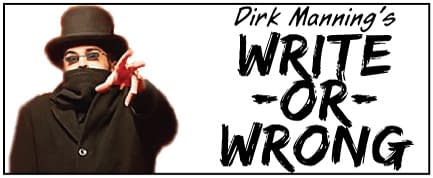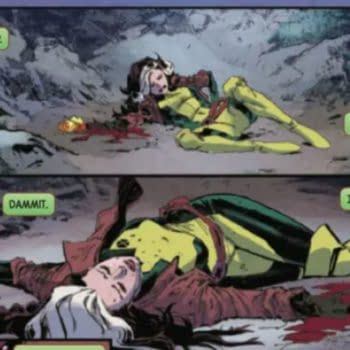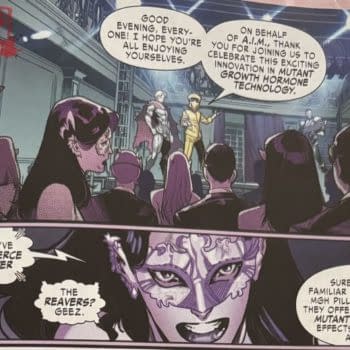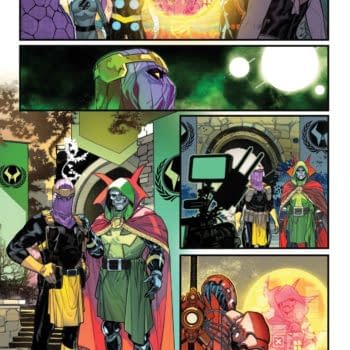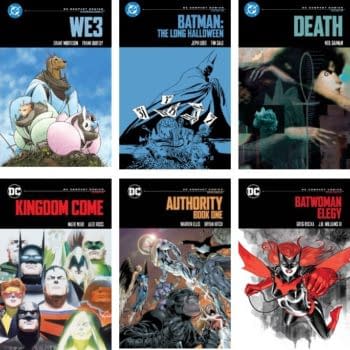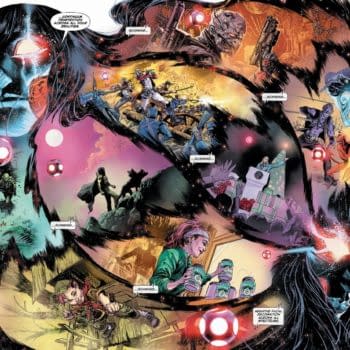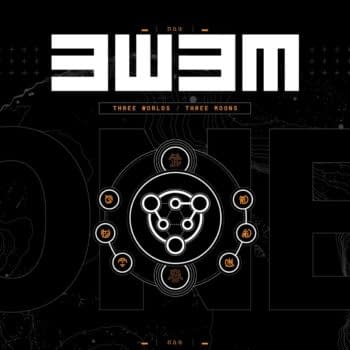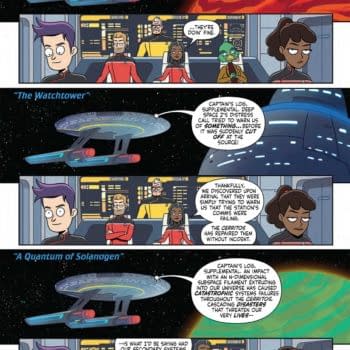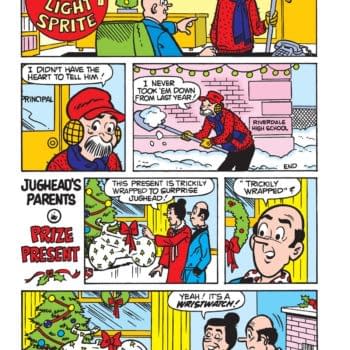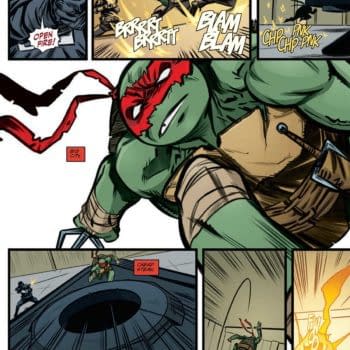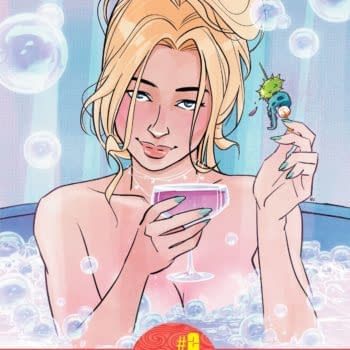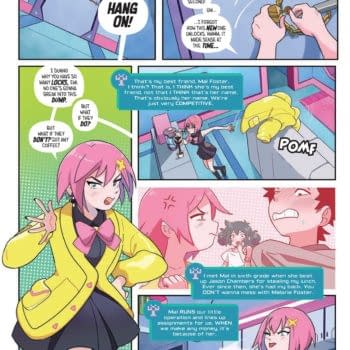Posted in: Comics | Tagged:
The Rub (1 Of 2) – Write Or Wrong by Dirk Manning
Dirk Manning writes;
Given that we're barreling towards the end of 2013, I finally launched my own website, conveniently located at www.DirkManning.com. On the site under the "Appearances" tab you can see the dates and locations of the 10 appearances – in 10 consecutive weekends – I'll be making in support of Love Stories (to Die For) from Image Comics/Shadowline, which just hit shelves nationwide this week. Yes, you read that right – 10 shows in 10 straight weeks!
If you haven't heard of the book, fear not, as Bleeding Cool was kind enough to run a ten-page preview a few weeks back right HERE.
If you're a fan of horror comics, Vikings, fighting vampires (specifically the non-sparkling kind), creepy science-fiction, and/or tragic love stories, Love Stories (to Die For) is the book you've been waiting for. As a 48 page flip-book containing two self-contained 22-page stories all for under $5, I'd argue it's the "deal of the week" in regard to sheer pages for your dollar value, and if you don't see it on the shelf the next time you're at your local comic shop, ask your store owner to order you a copy while there are still some left.
Cheap plugs aside, this month is going to be an interesting one for me as, along with the release of Love Stories (to Die For) and the beginning of my run of ten conventions/signings in ten weeks, this month also sees the release of the first issue of my four-part story arc on The Legend of Oz: The Wicked West from Big Dog Ink, which was also touched upon recently by Bleeding Cool HERE.
My run on The Legend of Oz: The Wicked West starts with Issue #12 and reveals the origin of the Flying Monkeys, how The Wicked Witch gained control of them, and what it means for them now that (mild spoiler alert!), as of Issue #12, Dorothy has assumed the mantle of the Witch of the West.
If that sounds like a cool story, you're right: it is! To that end I can't encourage you enough to make sure your local comic shop orders you a copy of The Legend of Oz: The Wicked West #12, as it really is a perfect jumping-on point for one of the most underrated comics currently being produced.
Deciding to write a four-issue arc on The Legend of Oz: The Wicked West for Big Dog Ink was something I debated with myself a bit before deciding to take the gig. While Tom and Kim of Big Dog Ink are great and professional people both of whom I've since grown to consider good friends – and that's to say nothing of how impressed I continue to be by all of the titles Big Dog Ink has been releasing for the last year or so – the fact of the matter is that I had to think long and hard on whether or not I wanted to commit to writing a full four-issue story that, regardless of how much of myself I invested into it, I wouldn't own.
You see, for those of you out there who aren't familiar with my work (and have no desire to read my Bibliography HERE), pretty much all of my comic writing to date has been for my own creator-owned books and titles.
In fact, for better or for worse, I've been so dedicated to my own creator-owned comics for the last decade that I've never sent any of my work to any major publishers for the purpose of soliciting work-for-hire comic writing gigs.
The result of my creator-focused philosophy was the opportunity to work with all sorts of talented (and oftentimes up-and-coming) artists to produce over 500 pages of creator-owned content such as Nightmare World, Tales of Mr. Rhee, Farseeker, Love Stories About Death (which was renamed Love Stories (to Die For) the just-released flip-book of new material) as well as some other assorted short stories here and there, such as "Te Vas Angel Mio" with Riley Rossmo for his Dia De Los Muertos series.
(If you're curious about any of the abovementioned titles, most of them can be read online for free via the "Online Comics" link at www.DirkManning.com.)
By not chasing after a lot of work-for-hire gigs, doing things like begging editors to let me write the continuing adventures of Captain Cape (or whomever), I've produced a pretty sizable amount of work that, should I ever decide to more aggressively pursue more work-for-hire writing, I can show as examples of why I should be given such an opportunity.
Even at the risk of sounding like I'm tooting my own horn, I'll be the first to tell anyone who asks that, yes, I'm very, very proud of the body of work that I've assembled to date – just as I'm equally proud that so many people have enjoyed and supported the work over so many years.
That being said, though, there's always that desire to be "bigger" in terms of both financial success and even, I'll begrudgingly admit, recognition as a comic writer worth knowing about and following.
That's certainly not to say that I'm not aware or appreciative of how much success I've had in my comic career to date. As proud as I am of all I've accomplished to date, I'm equal parts grateful to have gotten to the place I am in my career, especially considering obstacles including (but not limited to) working two other jobs for most of this same time period and overcoming a near-fatal injury that, even when survived, almost ended my writing career.
I've been very, very fortunate in my writing career to date, but as Thomas Jefferson once said:
"I'm a great believer in luck, and I find the harder I work, the more I have of it."
Success in any field is earned, and it's not by fluke that Nightmare World was picked up by Jim Valentino for his Shadowline wing of Image Comics,/b>, and then three-fourths of the online edition of the series were collected in three very nice trade paperback collections that still sell so well that they usually cover all my convention appearance expenses (and that's despite the fact that the last volume was published a few years ago and that I have yet to publicly disclose the big media deal I signed over the property, which is something I won't do until it either looks like it's actually going to result in something…or when the contract expires/is non-renewed).
It's also not by fluke that the ink literally just dried on a print publishing contract for my second online horror series Tales of Mr. Rhee, complete with a cover for the TPB collection illustrated by one of my favorite artists working in comics today (to say nothing of "Volume Two" being illustrated even as I type this).
Nor is it by fluke that my all-ages friendly fantasy comic Farseeker enjoyed a nice run at the prestigious Act-I-Vate online comic hub, was featured on the MTV Geek! Website for a month, and culminated with me being interviewed by MTV about the series. Len O'Grady and I had to put the series on hold for a bit, but it's returning soon! Honest!
Also – and, please, stop me if you've heard this one – it's not by fluke that the three full issues of Love Stories About Death we hosted at www.ShadowlineOnline.com resulted in us publishing two new full-length stories in print in the aforementioned (and really cool) flip-book format titled Love Stories (to Die For) from Image Comics.
Some people (read: "haters") may argue that I've just been "lucky," to them I again refer to the Thomas Jefferson quote I mentioned a moment ago.
So, all of that considered (which doesn't even factor in the success I've had with this very column and the Write or Wrong: A Writer's Guide to Creating Comics book it inspired, as well as stuff like my short story for Zenescope's Grimm Fairy Tales 2012 Halloween Special my occasional contributions to Tony Valenzuela's YouTube horror film series BlackBox TV), yeah… I have it pretty freakin' good compared to a lot of my peers.
Still, the hunger to be "bigger" is still always there, gnawing at me, and as much as I hate to admit it, the fact of that matter is that, yeah, I'd love to receive more "mainstream" recognition that doesn't involve me getting into an online spat with a disgruntled publicist over a year-old shared meme. (If you don't know what I'm referring to, honestly, you're better off for it.)
While it would be nice if we lived in a world where success was measured by effort alone, the reality of the situation is that this isn't the case. In any entertainment field there also has to be that "connection" between the audience and either the creator himself/herself or, more likely, the creator's product…
And therein lies the "Catch-22" for me and a lot of other "independent" creators (most likely including you, especially if you've read along this far) who make comics.
In a medium that is dominated not only by superheroes – but specific superheroes owned by two specific publishers – how can you, the creator of your own work (rather than the curator of preexisting properties) hope to gain/earn more exposure and/or financial success via what we often dub the "hardcore" comic enthusiasts who so diligently support mainstream superhero books?
Don't bother trying to answer that, folks, as it's a trick question based on a faulty assumption.
You, the producer of creator-owned comics, should not make it your main priority to chase after that audience.
Rather, you should be trying to gain the support of the audience who will be most receptive to what you are doing with your creator-owned books.
For example, in my case, many horror aficionados – and most horror comic aficionados – know who I am and support my work. It's because of this that I can afford to do things like go on signing tours for ten straight weekends, attend comic cons, horror conventions, comic/book shop signings, and the like.
Conversely, most people who only read mainstream superhero comics have never read any of my work and may very well have no idea who I am – or, as is often the case, know me primarily/only as "The Write or Wrong Guy."
Would it be nice to have, say, the Batman crowd lining up at my door (or at least my table at conventions), singing the praises of my work and buying every new book I release?
Of course it would… but why would they do such a thing when – wait for it – I'm not writing/producing Batman-based comics?
As a comic creator, it's important to remember that, at best, your work is only going to attract fans of the genre of work you create.
Let that whole Zen koan sink in for a moment.
Cool?
OK, now read it one more time, as I've written it below, with a little more emphasis on a few of the most important components:
At BEST, your work is ONLY going to attract FANS of the GENRE of work you create.
One of the things that I see far too many up-and-coming creators try to do – especially at conventions, where there's an embedded incentive/urgency to make one's money back (at best) or be validated through attention (at worst) – is target everyone with their work.
My friends, there is no comic out there – and I daresay no piece of art in any medium – that appeals to EVERYONE.
Sure, there are some rare "crossover" titles out there that seemingly appeal to a vast swath of people, such as Sandman, The Walking Dead, Bone and even Hellboy, but for every person who reads one of these "crossover" titles despite the fact that it's outside of his/her normal reading habits, there are at least three more people who will never, ever read any of those comics, no matter what.
It's not that such people are bad people, or even overly stubborn people. Rather, it's that, as fans of comics, we all read what we like and – because most of us are creatures of habit (not to mention creators of limited budgets) – it takes a lot to get us to try new things.
To this end, you need to know your target audience, accept that your work will likely only appeal to a certain subset of the greater comic book reading audience, and then target those readers rather than trying to foist your work upon everyone within shouting distance.
Again, do I wish that more people would read, buy, and talk about my horror comics such as Nightmare World, Love Stories (to Die For), and the upcoming Tales of Mr. Rhee collection?
Of course I do, for reasons both financially and, admittedly, vanity based.
The fact of the matter is, though, that people who only read superhero books, or Marvel books, or manga, or the Batman family of books, or… whatever… will not give my books a second thought because it's simply not their type of thing.
And that's OK, folks.
Or, even if it's not OK, it's the reality of the situation, and as is the case with reality, there's very little you can do to change it. The fact is that most of us (yes… US) won't read stuff that we're not already predisposed to liking.
For example, I heard from several of my friends who read horror comics that Crossed continued to be a very good horror comic month in and month out.
Because I'm a fan of most of Garth Ennis' work (with the exception being the war comic stuff since, try as I might, I simply can't get into most military-themed comics) I bought the first TPB collection when it came out a few years back and found it a very good horror comic.
(In fact, in this quick aside, I'll now publically admit here for the first time anywhere that the first Crossed collection is the only comic I've ever read that caused me to have nightmares the night I read it.)
While I was impressed with the first Crossed story-arc, my impression was that the comic was continuing to get even more "extreme" as it went on (something that The Beat blogger Heidi MacDonald recently commented on and our own Rich Johnston counter-commented on HERE), and given that I've never been a huge fan of "extreme" horror I never went back to read any additional issues or books in the series.
As time passed and more and more of my horror-loving friends talked about how good Crossed continued to be after that first story-arc, my interest became more and more piqued. The positive "buzz" for the book from my fellow horror fans, combined with the fact that several creators whose work I've previously enjoyed were writing arcs for the title, convinced me to add it to my list of books to keep an eye out for in the "sale" bins at conventions. Soon enough I did indeed manage to find a run of the latest TPBs from such a vendor and I decided to pick them up.
(Dirk Fact: My few select weaknesses in life are female heavy metal singers, cool Cthulhu memorabilia, ice cream, and the "50% Off" bins at comic conventions.)
A short time later when I found myself in the mood for some good horror comic readin' I sat down and read the next few Crossed collections and found myself again impressed with how good Crossed remained.
As a result, I now pick up the new Crossed collections as they become available.
Now, is Crossed book for everyone?
Hell no.
Is it a book that I sometimes found myself almost uncomfortable reading?
Abso-freakin'-lutely.
But, hey, when I am in the mood to read a horror comic (or watch a horror movie), I want to feel scared (or at least made a bit uncomfortable), and in that sense Crossed hit the target, repeatedly, in some of the most visceral ways possible.
That being said, there is no way I would ever, ever, ever recommend the book to my mother…
Or even most people I know, for that matter.
However, as distasteful/vile/unacceptable as some people may find it (and trust me, there are a lot of people who will never so much as even crack the cover of this series, as is their right), the fact of that matter is that Crossed has its own specific niche audience that it caters to – as do superhero books, licensed property books, books with Photoshopped models airbrushed on the covers, mangas about boys who dress like girls (and vice-versa), etc…
And as I mentioned a moment ago, rarely do these divergent audiences intersect – especially in terms of the already niche audience of comic readers.
Regarding your own creator-owned work, it's important to ask yourself who your target audience is and perhaps not aggressively "go after" them (at least not to the point where it makes people want to avoid you), but do all you can to focus your energy and resources on gaining the attention of those people who will be most likely to give your creator-owned comics a chance.
For example, let's say that you write a creator-owned book about a super-villain who wants to be a superhero instead, as that's a theme that a lot of people choose to explore in their creator-owned comics.
If that's you, you would probably think it would be great if everyone who read Superior Spider-Man by Dan Slott (which explores a similar theme) would also read, enjoy, and support your creator-owned comic too, right?
To this end, yes, you should indeed consider trying to dance the dance in which you attempt to let people know about how, if they like Superior Spider-Man , they may enjoy your creator-owned comic, too… without going so far as to ride the coattails of the Superior Spider-Man book in order to get yourself and your work that ever-so-sought-after support/validation.
If that sounds tricky, don't worry, it's even more difficult than that.
You see, you also need to consider that there's a certain portion of the Superior Spider-Man audience who is supporting the book not because it's about a super-villain who is now trying to be a superhero, but rather because they buy all of the stuff Dan Slott writes.
Some of book's supporters are buying it primarily because they like the artwork of Ryan Stegman.
Some are even buying it strictly because they're fans of Doctor Octopus, who is now living in the body of Peter Parker/Spider-Man.
Then there's the people who buy it not because they like it, but because they own every Spider-Man comic to come out in the last twenty-years and they don't want to "break the run."
Considering this, you need to think about who the target audience for your book is and then go after them. As I mentioned in the Write or Wrong: A Writer's Guide to Creating Comics, it's not about seeking to imitate the masters, but seeking what the masters sought.
Who is the audience for your book? Embrace that, and then make your work available to them.
This strategy may not get you "mainstream" success if you're not one is creating "mainstream" books (he types, looking in the mirror), but it will give you an opportunity to earn and enjoy success more than trying to be everything to everyone ever will.
Now, all of that being said, here's "the rub" from which this column has derived its name: No matter how good your creator-owned books may be, there are some people who won't read it because… get this… they're creator-owned books.
Yes, really.
We'll talk about that – and what it means for you as an up-and-coming professional and a creator of creator-owned comics (since none of you are going to start your career writing comics for Marvel,, DC or any other publisher of corporately-owned characters, for that matter) – in the next column.
***
Next Column: "The Rub" (Part 2 of 2)
Dirk Manning is the writer/creator of the Nightmare World trilogy of graphic novels and the Love Stories (To Die For) one-shot flip-book (all from Image Comics/Shadowline and currently available to order from your local comic shop) as well as Write or Wrong: A Writer's Guide to Creating Comics (from Transfuzion Publishing and available exclusively through Amazon.com either in print of as a Kindle e-book). Along with the aforementioned comic-related work, he has also written several short films for BlackBox TV and some other cool projects, all of which are detailed on his newly minted website www.DirkManning.com. Dirk lives on the Internet and can usually be found lurking around Facebook, Twitter and now even www.DirkManning.com on a fairly regular basis… when he's not busy writing, of course. Feel free to follow him at one or all such locations if you're into that sort of thing. Cthulhu is his homeboy.


